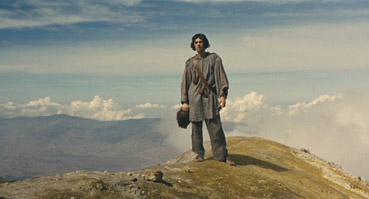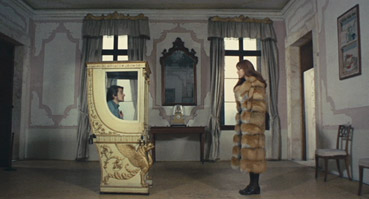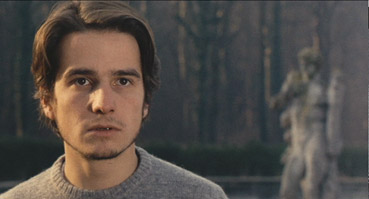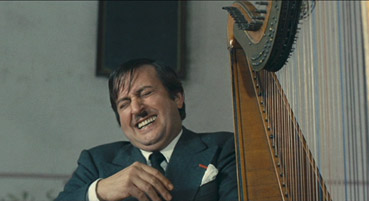| |
"I've tried to have opinions, but I've realised that even as a revolutionary, I am a conformist." |
| |
Julian Klotz |
| |
"I killed my father, I ate human flesh, and I quiver with joy." |
| |
The unnamed scavenger's first and last words. |
Pier Paolo Pasolini is one of the few filmmakers that some of us at Outsider continue to struggle with. It's not that we don't admire and even like his work, but when Pasolini titles land on the doormat I'm almost deafened by the sound of writers – myself included – suddenly revealing that they're too busy to take on a new review. It's difficult to write about Pasolini because he's long since been established as a cineaste's auteur and his films have been analysed to the point where a straightforward review feels a little anaemic. Mind you, it's hard to write a straightforward review of a Pasolini film because Pasolini films are never straightforward. They are often challenging and even confrontational, and taking one on can soon tie you up in literary knots, as I discovered a couple of years back when I began work on a review of his notorious Salò, or the 120 Days of Sodom; I was six weighty paragraphs in before I realised I had yet to start discussing the film. I never got round to completing it.
His 1969 Pigsty (Porcile) is generally regarded, even by Pasolini himself, as one of his more difficult films. Having landed the job of reviewing the disc on a short straw basis, I popped it in the player a little too late in the evening to watch it in one sitting, and twenty minutes in was having enough trouble connecting to its characters and structure to leave it for the night. It was a few days before I was in the right mood to give it second stab, and rather than attempt to pick up where I left off I started again. To my complete surprise, this time around I quickly became hooked and by the midway point I was utterly gripped. A difficult film? Maybe. Confrontational? Absolutely. But Porcile is also bold, complex, and even darkly humorous. And it has teeth.

Two seemingly disconnected stories unfold in tandem. In the first, an unnamed young man wanders a sparsely populated volcanic wasteland in some distant past, scavenging for anything that could constitute food. There's little on offer. Eventually he spies a lone soldier who has become separated from his unit, with whom he does battle and eventually kills and eats. In the second story, the son of a wealthy German industrialist, one Julian Klotz, debates with his radical girlfriend Ida their position on relationships, the bourgeoisie, and revolutionary action. When Julian falls ill, a detective who was hired to spy on him by his parents arrives to report his troubling findings to Julian's father.
The two tales differ in more than just content. While characters continually converse in Julian's story, its companion plays almost completely without dialogue, the only line delivered being the brief confession quoted at the top of this review. And while the Klotz family hold most of their discussions within the confines of their opulent mansion, the scavenger's story takes place exclusively in the open air. Filmed on the slopes of the still active Mount Etna volcano, the imagery here is sometimes breathtaking, creating a very real sense that the protagonist has fallen through a wormhole from medieval time into the Paleolithic era. Most striking of all is the huge volcanic vent whose regular expulsions of steam give the impression that the mountain is steadily breathing, a giant exhalation into which the scavenger hurls the heads of the people he hunts and kills for food. It's an act that feels both practical and symbolic, disposing of any identifying evidence and simultaneously offering a sacrifice to the god of the mountain.
Or is it? With no clear explanations offered, it's left very much to us to provide our own interpretations, and while opinions will vary, the pointers are often clear and occasionally quite blunt. Julian's father is a case in point, a wheelchair-confined ex-Nazi with a Hitler moustache and hairdo who regards the words 'Jew' and 'pig' as linguistically interchangeable and giggles like a schoolgirl at the term "Jewish Bolshevik commissioners." As a symbol of the then new German capitalism, he is fixated on destroying his chief rival, Herdhitze, but the two end up merging their firms into a potentially world-conquering industrial conglomerate. There seems little doubt that cross-cutting between the two stories is designed to be read in political terms, something that hits home when the previously lone scavenger takes on a partner and the pair begin to expand their operation, sexually exploiting female captives and consuming the vulnerable.

The stylistic manner which Julian's story is filmed, with characters often positioned symmetrically against backgrounds like living geometric frescos, repeatedly distances Julian from his fiancée, enclosing him symbolically in a lavishly decorated sedan chair while Ida stands before him like an overdressed servant, and separating the pair as they take a rare walk outside by positioning them on opposing sides of the mansion's huge water garden. That the two never really seem destined to marry is confirmed when Frau Klotz and Ida discuss the comatose Julian's mysterious lover, then swapping notes on his personality and disagreeing on every point as if talking about two completely different people. While this at first feels as if one of the women is taking a deliberately contrary stance to antagonise the other, it seems more likely that both are correct, a real-world reflection of how we tend to judge people on what we think we know about them, based almost solely on how they behave in our company. It turns out by the end that neither really knew him quite as well as they believed.
But in spite of its rich symbolism, its jet-black humour (Herr Klotz enthusiastically strums his harp to underscore detective Günther's tales of Nazi atrocities), and the occasional sense that Pasolini is simultaneously parodying and playing tribute to Godard (at one point Julian and Ida's banter is played almost straight to camera), it's the scavenger's story that proves the most arresting. Stripped of the crutch of dialogue and shot with an almost vérité realism – punctuated by spectacular landscapes and Bergman-esque wide shots of characters framed on hilltops against the skyline – the story here unfolds with impressive cinematic economy. The scavenger's descent into cannibalism is a prime example, communicated not graphically but through a tightly structured use of suggestion, performance, editing and sound – a headless body is carried off, a lit fire burns and the scavenger contentedly chews, the sound of which is enhanced in a manner that prefigures its similar and equally unsettling use in Fruit Chan's Dumplings 35 years later. Only later are his actions confirmed beyond question by a single static shot of discarded human remains. This storytelling economy is enhanced by being able to cross-cut between the two tales – when we next visit the scavenger he is still chewing away in the exact same position as when we last saw him, but this time the camera pans past him to reveal a second diner with whom he has formed an alliance. In no time at all they have grown in number to the size of a small platoon.

Heads have been scratched since the film's release about how the two stories relate to each other, and there's certainly a sense that they've not been juxtaposed just so that one can reflect the politics of the other. But by keeping the connection oblique and wildly varying the length of our visits to each (sequences can vary from several minutes to a single shot lasting only a few seconds), Pasolini almost seems to be challenging us to search for connections. And there are plenty of possibly false leads in the editing rhythm, to the point where I started to feel I was being deliberately being led up the garden path and left to run around naked in an intellectual nettle patch. And yet I couldn't resist trying to connect the dots, particularly given the similarity of age, appearance, and eventual fate of the two young protagonists.
Porcile was made in a period in which Pasolini himself claimed his films had become more problematic and more formally complex, and on the basis of Porcile I'd suggest this was a good thing, one worth quashing any apprehension you might have about going a few rounds with Pasolini the cinematic intellectual experimentalist. It's certainly challenging, but it's also far more rewarding than I'd somehow managed to convince myself it could ever be. The two stories play against each other to arresting effect, both in content and style, and in the process become almost organically bonded, connecting on a symbolic, socio-political and thematic level in ways that, while not always clear, always feel meticulously devised and executed. Even the title is loaded with multiple meanings, one that permeates almost every aspect of this consistently enthralling and darkly playful satire. And while it ends almost as suddenly and unexpectedly as No Country for Old Men's jarring final cut to black, the sinister overtones of that final line, delivered straight to camera with a cheerful air of criminal complicity, are genuinely chilling.
I've read some very negative comments about the previous US DVD release of Porcile, but the 1.85:1 anamorphic transfer on this Masters of Cinema DVD absolutely rights such previous wrongs. We can only assume that the source material was not quite of sufficient quality to warrant a Blu-ray transfer in a dual format release, but the DVD image is generally first rate. The picture is spotless, the colours solid (if slightly faded), and the contrast is crisp and well balanced, though does soften a little in a couple of darker scenes. The picture detail is often impressive, and while grain is visible, it never intrudes. A fine transfer worthy of the MoC badge.

The Dolby 2.0 mono soundtrack is in far better shape than you might expect, with dialogue and (especially) plucked harp strings clearly reproduced, without a hint of distortion or the sort of crisp treble bias you sometimes find on soundtracks of the period. The volcanic vents sound particularly good, and you'll have to crank sound up dangerously loud to hear any trace of background hiss.
Original Trailer (2:47)
A captivating trailer that plays intriguing games with still photographs of the principal cast, using symmetrical reflection to transform their faces into something more porcine.
Booklet
While slimmer than some in the MoC canon, the 20-page booklet still shines in its content, boasting a neat analysis of the film by Pasquale Iannone, Pasolini's own film notes, an extract from a 1969 interview with Pasolini from Cahiers du cinéma, film stills, poster reproductions and credits. The entire plot of both stories is given away here, including how they end, so I'd save this for after the first viewing.
Well there you have it. Everything I'd read had somehow convinced me I'd have real problems with Porcile, but just one viewing in I was happy to proclaim it one of my favourite Pasolini films. Challenging in ways that adventurous cinema should be and littered with rewards for those who are game, it looks and sounds great on Masters of Cinema's DVD. Not for everyone, perhaps, but still enthusiastically recommended.
|